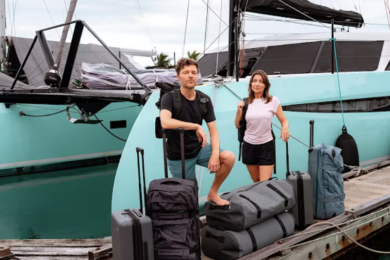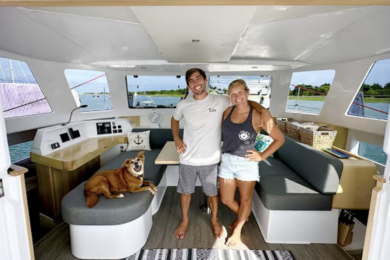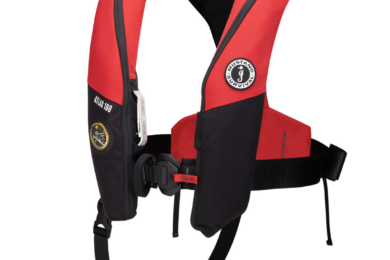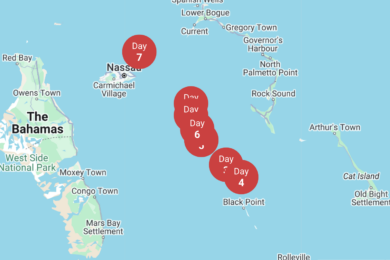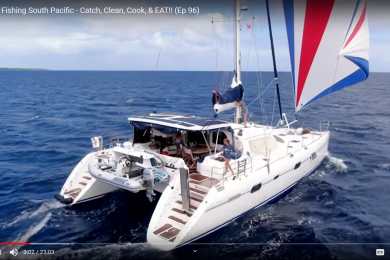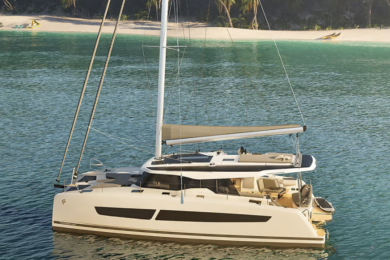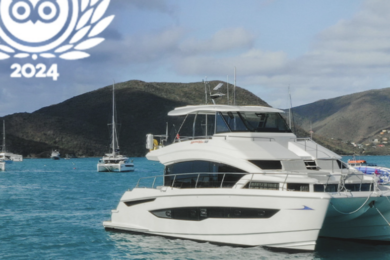
This winter thousands of North Americans will head to the tropics for some sailing and fun aboard bare boats in the many charter fleets. Here are some valuable tips from a veteran charter skipper and instructor (Published Winter 2016)
Read the contract! How many times in your life have you just clicked the box that says: “I have read and understood these terms” without ever reading or understanding them? Granted, most of the stuff in these documents is legalese but there are also some important details that you need to pay attention to when chartering a boat.
Such as, what time you have access to the boat, what time you need to be back at the dock, what time you need to be off the boat, what the hull insurance includes and what it does not include. If you have any questions, ask before you sign the contract. Especially before you pay the balance or step on the boat. You really don’t want any surprises after you spent a week having a great time sailing.
What’s available? Snorkel gear: masks, snorkels and fins take up a lot of real estate in your luggage. Find out if the charter company provides those items. However, if you are a snorkel connoisseur, you might want to bring your own mask and snorkel and then borrow the fins from the base. The snorkeling gear available at the base is probably well seasoned, if you know what I mean.
Communication: The VHF radio on the boat is your primary source of communication but it’s limited in range. Some charter companies provide simple phones to contact the base if needed (as well as contact you), some companies refer you to a vendor who will offer a free phone for basic services but pay for extras, some companies leave you hanging.
More and more often there are international data plans available for you to stay connected anywhere. For instance, on a recent charter in Greece, one of our crew members had international “free” data with T-Mobile and was able to get access everywhere we went. Check with your mobile provider because we have also had a guest who went bankrupt when she got the bill for the photos she uploaded on FaceBook while sailing in St. Vincent.

Cruising Guides: Most charter companies will provide a cruising guide. This is a great resource for local knowledge of anchorages as well as services. It will provide VHF hailing channels for services and activities.
Recharging Electronics: Be aware of outlet requirements on board. European versus American. You might need a 12-volt plug and an inverter. Also, if the boat doesn’t have a generator, you will probably not be able to recharge your devices away from shore power. Please note that it is not recommended to run your generator while under way due to wave action.
Safety: Don’t be the low hanging fruit. In other words, lock up your boat/dinghy, don’t flash your riches, anchor behind the fleet, leave a lot of lights on at night and be aware of your surroundings. Most of the places you visit will be welcoming and friendly but there is always the one guy!
What if things go wrong? Charter boats are used by a variety of people. Some know what they are doing, some do not. Usually, the boats are turned around the same day you bring them back so there is not a lot of time to fix things, especially if the previous charterer did not disclose a problem, don’t be that guy. If you have a problem with the boat, let the company know as soon as possible. Boats in general have issues, charter boats in principle will always have issues.
If the problem can’t be resolved over the phone and it is preventing you from going anywhere, often they can send someone out. The charter companies have contacts all over the cruising ground to fix things. Will this ruin your vacation? Maybe. Maybe not.
Don’t expect the company to issue a refund or comp you in any way unless there is a major issue that could not be resolved in a reasonable amount of time. Read your contract to find out if they have any type of guarantee for performance of the yacht you charter. The more reputable companies will work with you, the not-so-reputable ones will take your money and run. If you can’t resolve an issue with the local charter base manager, go to the next level of management before you complain on social media. Give them a chance to make it right.
Provisioning: Most charter companies offer a provisioning service but it will cost you. If you factor in the time it takes to shop and taxi fare, it might be worth it. Make a meal plan and a shopping list ahead of time. Small islands ship in most of their supplies so don’t expect to find everything you want. Be ready for substitutions. That’s all part of the charm. Breakfast, lunches and snacks on board are a good start. You will want to enjoy the local cuisine and culture of the area by dining out. Have a back-up plan for dinner on board in case the bay you are anchoring in for the night does not have any services, or during low season when shops are closed.
Souvenirs: Aside from the “Sail Fast, Live Slow” t-shirt or hat from Foxy’s, consider local spices or candies. Sea salt from Union Island in the Grenadines, Erica’s Hot Sauce from St. Vincent or organic chocolate from Grenada make great gifts. Buy any alcohol at the duty free shop to ensure that it is airport approved. If it’s over proof, it will be confiscated. Besides, what else are you going to do while waiting for your flight. Some shops even offer free tastings.
Insects & other creatures: Keep uninvited guests off the boat by disposing of any cardboard before you leave the dock. Mosquitos are not much of a problem while under way or at anchor with a breeze. But, when you go ashore, carry your bug repellent with you. If you forget, even the local rum shacks have a spare bottle behind the bar. Sand fleas on the beach are especially a nuisance. Keep fruits covered with a towel to prevent flies. Also, be aware that if you leave your sliding door open at night, bats are known to sneak in and eat your bananas. What a mess!
Do your homework before you charter: Check review sites such as Trip AdvisOr or sailing forums. Some companies will greet you at the airport with a rum punch or a welcome bottle of spirits. Other companies will leave a note on the door with a pile of sheets on the bunk. (Hint: tie a knot in the corner of the sheet to make a custom fit.) When reading reviews, toss out the best & the worst and read between the lines.

